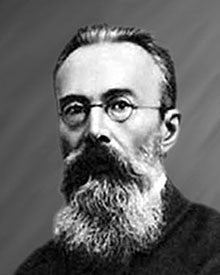
(1844 - 1908)
The son of a noble family influenced by his much older brother to enter the St Petersburg Naval College in 1856, Rimsky-Korsakov took his first steps in composition in 1860 under the guidance of that influential doyen of Russian musical nationalism, Mily Balakirev. After an inspirational meeting, the 17-year-old naval cadet set off to sail the world and to work on the symphony Balakirev had encouraged him to write (part of it was completed off the English coast at Gravesend). Back in St Petersburg, he contributed several significant scores as one of the group of composers gathered around Balakirev and known collectively as ‘The Mighty Handful’, chiefly the symphonic suite Antar, a tone poem about the legendary Novgorod minstrel Sadko that was to form the basis for his much later opera of that name, and his first opera, The Maid of Pskov (1868–72), much influenced by his close friend Musorgsky’s Boris Godunov.
Nikolai Rimsky-Korsakov Composition Timpani and Percussion Requirements
Cappriccio Espagnol
Timpani
Int'l 29/26 Prem 30/28
5 percussion
Orchestral bass drum, clash cymbals, suspended cymbal, castanets, triangle, tambourine, snare drum
__________________________________________________________________________________
Coq d'Or
Timpani + 4 percussion
Orchestral bass drum, clash cymbals, triangle, snare drum, glockenspiel, tambourine
__________________________________________________________________________________
Russian Easter Festival Overture
Timpani + 5 percussion
Tam tam, glockenspiel, snare drum, orchestral bass drum, clash cymbals
__________________________________________________________________________________
Scheherezade
Timpani
Int'l 32/29/26 Prem 32/30/28
5 percussion
Tam tam, triangle, snare drum, clash cymbals, orchestral bass drum, tambourine
__________________________________________________________________________________
